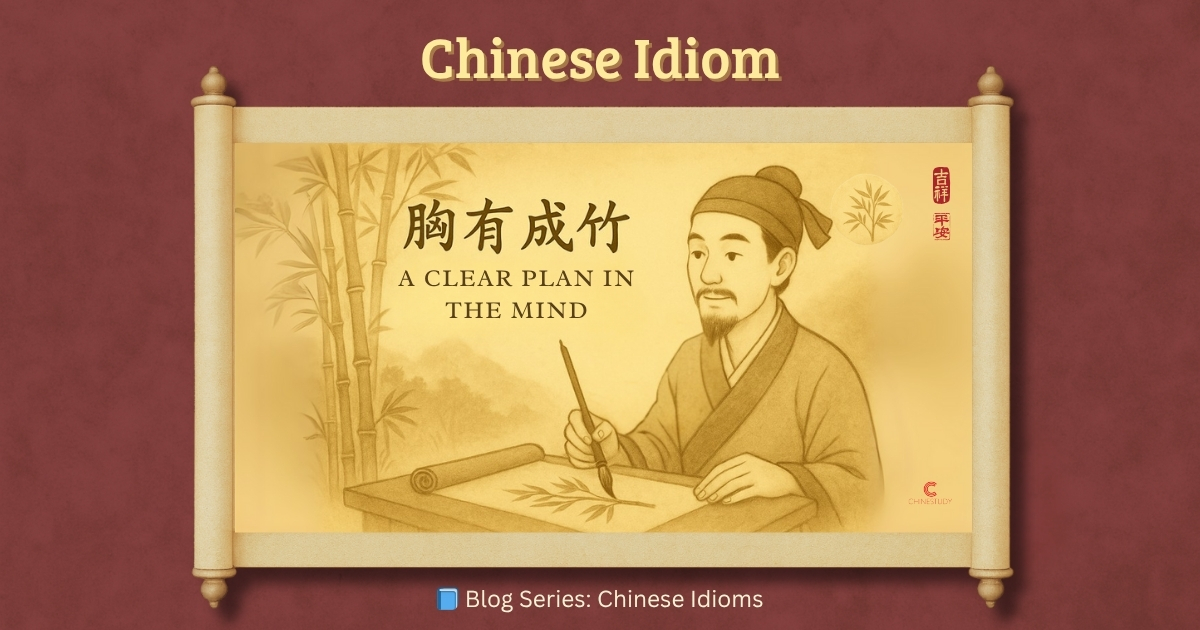🎋 胸有成竹 xiōng yǒu chéng zhú – Calm and Ready to Begin

🔍 What It Means
胸有成竹 (xiōng yǒu chéng zhú) literally means:
“A fully-formed bamboo in the chest”
Word-by-word breakdown:
- 胸 (xiōng) – chest
- 有 (yǒu) – to have
- 成 (chéng) – complete, finished
- 竹 (zhú) – bamboo
It might sound strange at first, but it’s a beautiful metaphor.
It means: Before taking action, you already have a clear picture or plan in mind.
You’re calm, confident, and well-prepared because the idea is already fully formed inside you.
In English, it’s like saying:
- 🧠 A clear plan in your head
- 🧘 Calm and confident before starting
- 🎯 Knowing what you’re doing before you begin
🏺 Where It Comes From
This idiom comes from the story of a famous painter during the Song Dynasty named Wen Tong (文同).
He was especially good at painting bamboo.
People asked him, “How can you draw bamboo so quickly and perfectly?”
Wen Tong replied:
“Because the entire bamboo is already in my chest before I pick up the brush.”
In ancient Chinese, “chest” was often used to mean a person’s inner mind or carefully held plans.
So when Wen Tong said the bamboo was already “in his chest,” he meant he had already imagined and prepared the whole painting in his mind — the lines, shapes, and flow — before the first stroke.
That became a metaphor:
If you prepare deeply and clearly ahead of time, your actions will be confident and smooth.
💬 How to Use It
Use 胸有成竹 (xiōng yǒu chéng zhú) when someone is well-prepared and handles things with calm, quiet confidence.
❌ Not for lucky guesses or bold risks
✅ Often used to praise someone who plans ahead
✅ Common in exams, interviews, speeches, business, and more
✅ Sounds polite, smart, and quietly impressive
🎯 Real Examples
1.
她复习得很好,考试时胸有成竹,一点儿也不紧张。
(Tā fùxí de hěn hǎo, kǎoshì shí xiōng yǒu chéng zhú, yìdiǎnr yě bù jǐnzhāng.)
👉🏻 She studied well, so during the test she was calm and confident.
2.
他一上台就开始演讲,胸有成竹,完全不像第一次参加比赛的人。
(Tā yí shàngtái jiù kāishǐ yǎnjiǎng, xiōng yǒu chéng zhú, wánquán bú xiàng dì yī cì cānjiā bǐsài de rén.)
👉🏻 He started his speech calmly and confidently — you’d never guess it was his first time competing.
⚠️ Common Mistakes (Watch Out!)
❌ Mistake: Thinking this means someone is talented or lucky
✅ Correct: It means they’re prepared and thoughtful — not just gifted
❌ Mistake: Using it to brag or show off
✅ Correct: It suggests quiet, humble confidence — not arrogance.
💡 Memory Tip
Imagine you’re about to take an exam.
Everyone around you is panicking.
But you studied hard — and before you even open the paper, you can already picture the answers in your mind.
That’s 胸有成竹 (xiōng yǒu chéng zhú) — the plan is already inside you.
🧩 Interactive Practice
Translate this sentence into English:
- 老师问问题时,他总是胸有成竹地回答。
Answer:
When the teacher asks questions, he always answers calmly and confidently.
🌟 Final Thoughts
胸有成竹 (xiōng yǒu chéng zhú) reminds us that real confidence comes from preparation.
When you’ve already pictured your next step, nothing can shake you.
Next time you feel prepared and confident, ask yourself — is there a little bamboo already in your chest? 🎋
🏮 One story ends, but many more await…
👉 Stay tuned for the next idiom in this series!
Thank you for subscribing!
Have a great day!